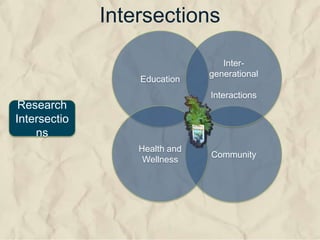2010 09 01 fairhill forest garden 02
- 1. Intersections Inter- generational Education Interactions Research Intersectio ns Health and Community Wellness
- 3. Why Might a Teacher Want to Integrate the Garden into Curriculum? • Being in nature more frequently improves physical, cognitive and spiritual well-being of students, leading to improved performance. Being in nature more frequently reduces teacher burn- out. Improved student awareness of healthy foods and healthy food preparation leads to healthier nutritional decisions, which leads to healthier minds and bodies, which leads to improved performance, which leads to higher school rankings.
- 4. Why Might a Teacher Want to Integrate the Garden into Curriculum? • Educating environmental stewardship is an opportunity to contribute to the sustainability of the planet. The garden is a concrete framework for teaching life skills such as project planning, project management, community outreach, website development, and youth leadership. Working in the garden contributes to the beautification of the work environment.
- 5. Why Might a Teacher Want to Integrate the Garden into Curriculum? Fostering ownership of the garden builds a student’s sense of pride and responsibility. It is exciting to be part of a cutting edge educational revolution and the potential to benefit from significant additional resources if the No Child Left Inside bill gets approved by the Senate in 2010.
- 6. Why Might a Student be Interested in the Edible Garden? • Being in nature improves physical, cognitive and spiritual well-being, leading to improved performance. • The garden provides the opportunity to learn about math, science, geography, economics, health, and life skills. • Today’s children spend hardly any time in nature. By optimizing the quantity and quality of the TIS children's exposure to nature, the children will develop a desire to carry on the crucial work of restoring the earth’s ecological balance.
- 7. Why Might a Student be Interested in the Edible Garden? • Growing your own food and sharing this knowledge with your family builds a sense of empowerment. • The garden provides opportunities for experiencing the joy of working with the Judson elders and other community neighbors. • The garden fosters a sense of connection with the Fairhill community and Cleveland local food movement. • The garden provides a greater opportunity to be
- 9. Why Might Fairhill Partners be Interested in the Edible Garden? • Opportunity to be show-cased as the “host” organization of a cutting-edge garden project at a number of intersections. • Opportunity to attract additional high quality organizations. • Opportunity to beautify the grounds and to improve the outdoor experience for all who work or live at Fairhill Partners. • Opportunity to integrate ecological principles into
- 10. Why Might the Surrounding Community be Interested in the Edible Garden? • Opportunity for involvement through volunteering. • Opportunity to exchange time or money for fresh fruits, nuts and vegetables. • A greater sense of connectedness with neighbors increases emotional well-being and safety.
- 11. Why Might the Cleveland Urban Farming Community be Interested in the Edible Garden? • Other Cleveland community gardens and urban farming initiatives will indirectly benefit from the evidence-based design of the Fairhill Partners Forest Garden with respect to improved outcomes for children, elderly, families, and community.
- 13. Why Might the Judson Community be Interested in • the Edible Garden? The garden provides the opportunity to build on the work through FIGGS (Fairhill Intergenerational Garden Group Students). • The garden provides deeper and broader learning. • The garden and intergenerational garden stewardship sustains positive health impacts for elders as a result of physical exercise, emotional connectivity, and cognitive stimulation.
- 15. Why might the FP’s Health and Wellness Center be interested in the Garden? • There is an opportunity to support clients by developing “pathways” (through the garden) for achieving optimal physical, emotional, cognitive and spiritual well-being. • There is a growing body of evidence supporting the hypothesis of “nature-deficit disorder”. The disorder’s treatment includes nature-based and place-based education. • The garden is a living experiment whose evidence can be shared with the medical and educational communities and used for future grant applications.















